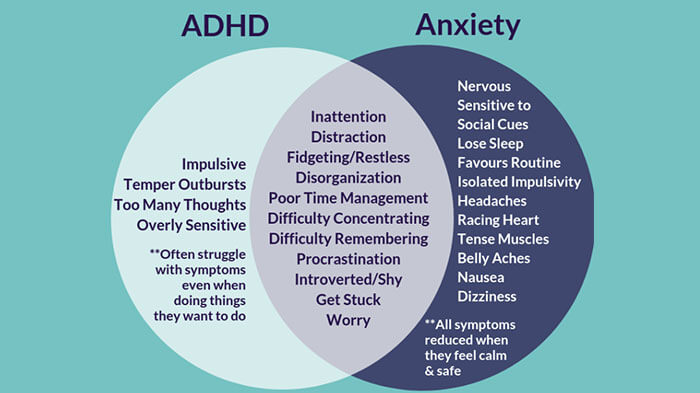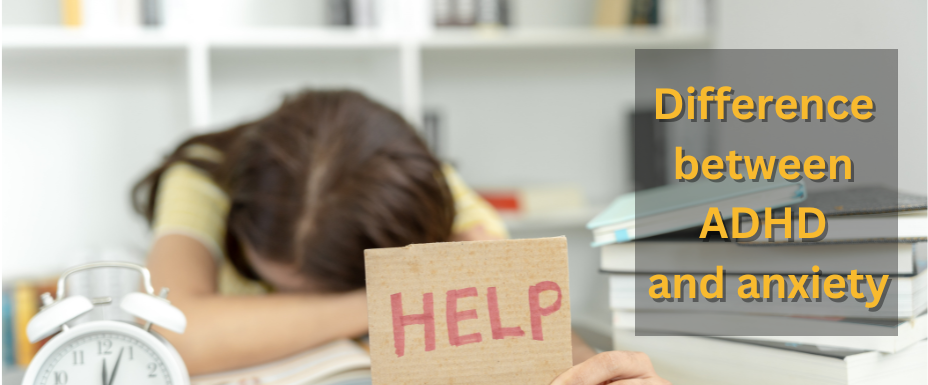Difference between ADHD and anxiety
ADHD and Anxiety
ADHD also called attention deficit hyperactivity disorder, and anxiety is two different conditions. Still, for some people, they come as a package as in both the conditions at the same time. Sometimes symptoms of other mental health issues can be masked by ADHD symptoms. A study states that over 60 percent of individuals with ADHD have a co-existing or comorbid condition.
About half of the adults (ages 18 or more) with ADHD also experience an anxiety disorder. According to a report, about 30 percent of children and 50 percent of adults with ADHD have an anxiety disorder. If you are one of them, healthy lifestyle choices and the proper treatment can improve your symptoms and ease your anxious feelings.
This blog will help you look into the difference between ADHD and anxiety and give a sight of available treatment options.
ADHD vs. Anxiety

If you are dealing with ADHD, it may be challenging to recognize the symptoms of this medical condition. Attention deficit hyperactivity disorder (ADHD) is an ongoing medical condition that usually begins in childhood and can continue into adulthood. It can affect an individual’s ability to concentrate, control impulses and may cause behavioral issues, such as:
- hyperactivity
- lack of impulse control
- lack of attention
- fidgeting and trouble sitting still even for a short period
- difficulty organizing and completing tasks
An anxiety disorder is not some occasional anxious feeling but a mental illness that is severe and long-lasting. Anxiety can make you feel uneasy, distressed, distracted, and terrified in benign situations or regularly.
If you have an anxiety disorder, your symptoms are likely to ve so severe that they can affect various pillars of your life, such as work, study, relationships, or even daily life activities.
The ADHD symptoms are pretty different from those of anxiety. It primarily includes issues concerning focus and concentration. In comparison, anxiety symptoms involve problems with fear and nervousness.
In ADHD, one can experience the following symptoms:
- forgetfulness
- difficulty paying attention or concentrating
- trouble completing tasks
- difficulty listening and understanding instructions
- a feeling of restlessness (or inability to relax)
- inability to focus for an extended period
In an anxiety disorder, one may experience the following symptoms:
- difficulty concentrating or paying attention
- a feeling of restlessness (or inability to relax)
- chronic feelings of worry or nervousness
- irritability
- fear without an apparent cause
- headaches and stomachaches
- trouble sleeping or insomnia
- fear of trying new things
Even though ADHD and anxiety have unique symptoms, sometimes both conditions mirror each other. And that can make it challenging to tell whether an individual has ADHD, anxiety, or both.
What to expect from ADHD and Anxiety?
When you have anxiety together with ADHD, it may worsen some of your ADHD symptoms, such as feeling restless or experiencing trouble concentrating. But anxiety disorder contains its own set of symptoms, such as:
- feeling on edge
- constant worry about several different things
- fatigue
- stress
- trouble sleeping
How can you differentiate between ADHD and anxiety?
Though you should always go for a professional evaluation, family members or close friends can also tell the difference between both. The key to doing so is to watch your symptoms over time.
If you have anxiety, you may find you cannot concentrate in situations that make you feel anxious. In comparison, if you have ADHD, you will find it challenging to focus; it may not vary according to the situation.
If you have both, the symptoms are likely to be some more extreme. For example, anxiety can make it even more challenging for someone with ADHD to stay focused and follow through on tasks.
Treating both anxiety and ADHD
When anxiety and ADHD co-exist, they can make daily life activities more difficult. An individual with ADHD who also have to deal with anxiety may find concentrating on tasks even more challenging. Hence, it becomes vital to get proper treatment to ensure a better quality of life.
Anxiety can also complicate any ongoing ADHD treatment as it tends to make people scared of trying new things. And, to deal with ADHD, you might need new strategies so that the healthcare professional can keep on top of your condition.
Treatment plans are likely to be assigned on the basis of the individual and the situation. Some people can get benefit from both conditions treatment simultaneously.
Other times, your healthcare professional may suggest treating just one of the conditions as the top priority. And this method may be inappropriate if ADHD is the reason behind your anxiety, as treating ADHD can help reduce the stress.
Several available treatment options can help people with both ADHD and anxiety.
Medication
Prescription medications are one of the most commonly used treatments for ADHD. However, if stimulant drugs are causing anxiety symptoms, your healthcare professional may prescribe other non-stimulant products. Your healthcare professional may also prescribe anti-anxiety medications depending upon your health requirements.
If taking several medications is not under the recommendation, or if the individual does not want to take them, a healthcare professional may prescribe medicine for one of the mental issues and treat others with therapeutic or lifestyle interventions.
Therapy and relaxation techniques
One may better manage anxiety associated with ADHD with:
- Relaxation techniques: You may practice some methods such as meditation, visualization, progressive muscle relaxation, and deep-breathing exercises that can help treat anxiety and stress by reducing muscle tension, slowing the heart rate, and boosting mood and concentration.
- Cognitive-behavioral therapy (or CBT) is a short-term intervention that helps individuals change their thinking patterns to influence their behavior positively. CBT is a widely recommended practice for anxiety disorders and has been proven effective in treating GAD and several other health conditions.
Lifestyle changes
In addition to the medication, considering an effective therapy, practicing relaxation techniques, and including several lifestyle changes can help people with anxiety related to ADHD.
Sleep: Tiredness due to lack of sleep can worsen the feelings of anxiety. A study has indicated that children with both anxiety and ADHD were somehow associated with sleep disturbances. We suggest people aim at getting quality sleep and wake up at the exact time each day. Those who find it challenging to fall or stay asleep should discuss the problem with their healthcare professionals.
Exercise: Regular physical activities can reduce anxiety levels in several ways, such as releasing brain chemicals that are likely to boost mood.
Nutrition: Consumption of healthy and balanced meals and keeping yourself hydrated can help manage anxiety. Also, reducing the intake of caffeine products and alcohol may be beneficial, as both these elements interfere with sleeping patterns.
Schedule tasks: It would be best to keep a list of tasks and activities that are required to be completed and set realistic timeframes for each work, ensuring you remember and achieve the goals. It can help reduce the level of anxiety.
How should a caregiver help?
- Try to give as much information as possible to the doctor on the symptoms experienced by the person in care, even those which do not seem like ADHD or anxiety. It will help the healthcare professional make an accurate diagnosis that will further add up to creating an effective treatment plan.
- Stay calm and understand the patient. Anxiety can cause individuals to get scared of trying new things, including new ADHD treatments or for anxiety itself. A feeling of stress can also add to the forgetfulness and lack of focus experienced by people with ADHD.
- Be supportive: Being negative or critical will only cause more stress and worry in people with ADHD and anxiety.
- You can control parental anxiety. Children learn how to respond to specific situations depending on their parents’ reactions. If your child has ADHD, your calm and positive nature can influence them to behave the same in stressful situations.
- You may consider parenting skills training as it can help parents learn new measures of understanding and responding to children with ADHD.
- Family therapy can also help parents & siblings who need a little extra support in dealing with the hardships of living with someone who has ADHD.
Bottom Line
If you have ADHD, it is essential to tell the healthcare professional all your symptoms, even if you believe they are unrelated. There are fair chances you could have an additional condition like anxiety.
Also, inform your health expert about any new symptoms as you may develop anxiety or another health condition over time. Once you are diagnosed with ADHD and anxiety together, you will be able to start treatment for both conditions.

